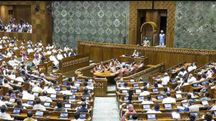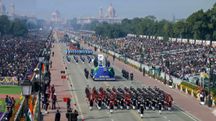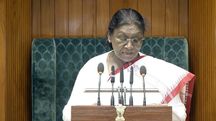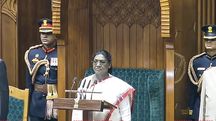Supreme Court directs MHA to file an affidavit with regards to the appointment of Nagaland DGP
The Supreme Court on January 10 directed the Ministry of Home Affairs to file an affidavit within a week indicating whether an officer's concurrence is required before appointing him as the Director General of Police (DGP) of a state, even if he is on deputation from the Centre.
 Supreme Court of India (File Photo)
Supreme Court of India (File Photo)The Supreme Court on January 10 directed the Ministry of Home Affairs to file an affidavit within a week indicating whether an officer's concurrence is required before appointing him as the Director General of Police (DGP) of a state, even if he is on deputation from the Centre.
A bench led by Chief Justice of India (CJI) DY Chandrachud has also requested that the MHA place the concurring rule.
The order was issued in response to a petition challenging the extension granted to Nagaland's incumbent DGP, T John Longkumer.
The court also requested a response from UPSC, detailing the steps it has taken to act in accordance with the MHA's letter of concurrence on the relaxation of eligibility criteria.
Last month, the Supreme Court chastised the UPSC over the Nagaland DGP appointment process, refusing to grant the Empanelment Committee Meeting 60 days to prepare a panel of officers for making appointments to the post. The Supreme Court also set December 19, 2022 as the deadline for a decision. It stated that the UPSC, MHA, and the State would handle the formalities.
As the consultation with the MHA on the matter is still ongoing, the Union Public Service Commission (UPSC) has urged the court to give at least 60 days time for the convening of the Empanelment Committee Meeting for the preparation of a panel of officers for appointment to the post of DGP, Nagaland.
The UPSC argued that as the extended tenure of the current DGP ends only on February 28, 2023, and since the process of appointing the panel of DGPs (Head of Police Force) can be finished before that date, there would not be any administrative disruption for the Government of Nagaland.
The Ministry of Home Affairs (MHA) gave its approval on August 31, 2022, to the Appointments Committee of the Cabinet for the extension of T. John Longkumer, IPS's service and inter-cadre deputation tenure from the Chhattisgarh cadre to the Nagaland cadre for a period of six months beginning on August 31, 2022, the date of his superannuation.
In a previous hearing, the court stated that they were of the considered opinion that the State of Nagaland should promptly transmit the name of the empanelled officers for appointment to the post of the DGP in light of the communication that the UPSC made on April 1, 2022.
The court had said that the list of empanelled officers will be created in conformity with the law when the shortcomings identified by the UPSC in its notification dated 1 April 2022 had been properly corrected. The UPSC must receive notification of the list of eligible officials who have been empaneled no later than October 31, 2022. The court stated in its judgement from October 17 that the UPSC must make a judgement on the matter on or before November 30, 2022.
An intervenor in the case, the Nagaland Law Students' Federation, claims that Nagaland State appointed an officer to the highest post in the State Police who first does not belong to the State Cadre, who has already served his tenure, whose name has been rejected by the UPSC for a further extension, and who is currently holding the said post, in an arbitrary and illegal manner. Additionally, the federation claimed that it shows the State Government's deceptive agenda.
The Federation added that by dismissing Shri Rupin Sharma prior to the completion of the required "two years" tenure, Nagaland State has disregarded the rulings of the Supreme Court.
The intervenor has asked the court to revoke the order from August 31, 2012, which gave T John Longkumer, IPS, a six-month extension after he retired.
Rupin Sharma was fired from his DGP position on June 20, 2018, and T John Longkumer, an IPS officer from the Chhattisgarh Cadre from the 1991 batch, was named the new DGP Nagaland on June 27 of the same year.
Also read :
Copyright©2026 Living Media India Limited. For reprint rights: Syndications Today









